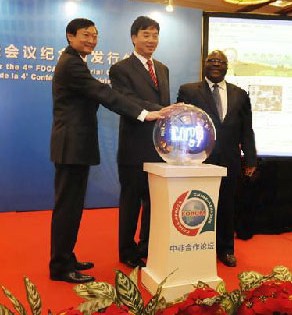|
Africa | World Economy - Development | Politics "Bullying China a threat to Africa"
Chinese-African relations have exploded during the last decade, with enormous Chinese investments and non-conditional loans and a boom in trade. A large part of Africa's impressive growth since 2000 stems from larger Chinese involvement.
Norway, which hosts the Nobel Peace Prize Committee, is already being exposed to such bullying from the Beijing government. A Norwegian Minister, upon reaching China to negotiate a fisheries deal, was told that her two meetings were cancelled. Norway-China free trade negotiations are put on ice and a Norwegian opera, due to be performed in China in two weeks, has been ordered to stay at home. But the region really knowing and describing China as a bully is its Asian backyard, where Beijing insists on total respect for its new role as superpower. Most neighbouring countries feel more or less threatened by China. China, in an ownership dispute with Japan over some uninhabited islands, cancelled all political meetings and talks between the two neighbours. This week, Beijing went even further, issuing an embargo on the shipment of so-called "rare earth" metals to Japan. The 17 metals are almost exclusively produced in China and needed in Japan's electronics industry. Vietnam, Taiwan, Malaysia and the Philippines have also experienced Chinese gunboat diplomacy over disputed small island territories in the South China Sea. The ruling Chinese strategy in a conflict of interest is a combination of a military show-off, a diplomatic freeze and economic sanctions. These are the reactions from China towards nations not playing by Beijing's rules. The Asian examples and Norway are also nations with which China's relations are much more balanced than with African nations. African states are far more dependent on China than China on African nations. Therefore, Chinese bullying tactics against any African nations would be even tougher than what Asian nations and Norway have recently experienced. Therefore, African nations do not dare to protest any Chinese decree. One might ask what is worst when it comes to securing African independence. Africa's traditional underdog relations with the West, or Africa's new chequebook-or-sanctions relations with bullying China? The only sure thing is that, as dependency deepens, it will be ever more difficult for African governments to open their mouth on China or to get relations balanced. This is of course in line with Beijing neo-colonial tactics. By Rainer Chr. Hennig © afrol News - Create an e-mail alert for Africa news - Create an e-mail alert for World news - Create an e-mail alert for Economy - Development news - Create an e-mail alert for Politics news
On the Afrol News front page now
|
front page
| news
| countries
| archive
| currencies
| news alerts login
| about afrol News
| contact
| advertise
| español
©
afrol News.
Reproducing or buying afrol News' articles.
You can contact us at mail@afrol.com









